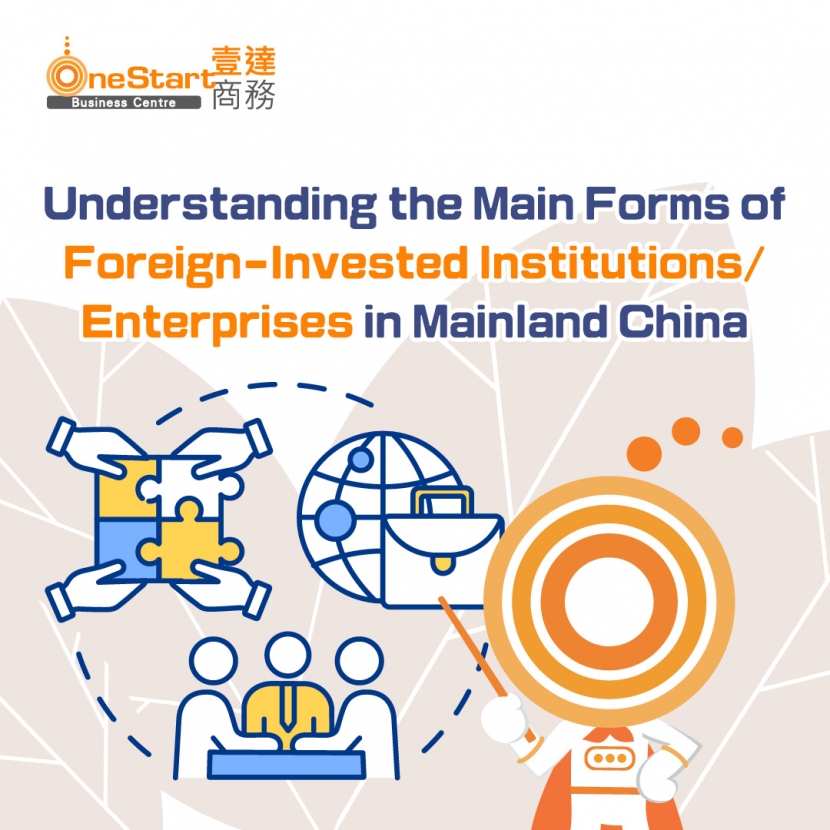Related Article:
Steps to Open a Company in Mainland China
Pros and Cons of Operating a Business in Mainland China
Table of contents |
In recent years, China has become increasingly open to foreign-invested enterprises, attracting the attention of numerous investors due to its vast market potential. In mainland China, foreign investors have the option to establish different types of business to enter the domestic market. This article will focus on introducing several types of business that foreign investors can establish, such as foreign-invested enterprises, individual sole proprietorship, and representative office. Whether you are a newcomer to the Chinese market or an investor who has been operating here for many years, understanding this information will be helpful in your business operations in the China market!

Foreign-Invested Enterprises (including Hong Kong, Macau, and Taiwan enterprises)
According to the newly implemented "Foreign Investment Law of the People's Republic of China" in 2020, foreign-invested enterprises refer to enterprises that are wholly or partially invested by foreign investors and registered and established in accordance with the law within China's territory. According to the Foreign Investment Law, foreign investors can establish four types of enterprises in China: wholly foreign-owned limited liability company, foreign-invested joint stock company (including Hong Kong, Macau, and Taiwan limited liability company, and Hong Kong, Macau, and Taiwan joint stock company).
Foreign-invested enterprises enjoy the following rights that are the same as general Chinese company:
- Free import and export trade in China
- Receiving income in RMB
- Issuing RMB invoices
- Employing staff
- Transferring profits abroad
- Engaging in international trade
For enterprises established before the implementation of the Foreign Investment Law (such as Sino-foreign joint ventures, wholly foreign-owned enterprises, and foreign-invested partnership enterprises), the organizational structure and institutions can be adjusted and corresponding registration changes can be made in accordance with legal provisions within five years after the implementation of the Foreign Investment Law. At the same time, the original organizational structure and institutions can also be retained.
Currently, terms like "Wholly Foreign-Owned Enterprise," " Foreign-Invested Partnership Enterprise," and " Sino-Foreign Joint Venture " are still commonly used in China to represent these investment forms.
Wholly Foreign-Owned Enterprise (WFOE)
A wholly foreign-owned enterprise refers to a limited liability company that is 100% controlled by an foreign individual or entity (including Hong Kong, Macau, and Taiwan enterprises). A wholly foreign-owned enterprise has independent legal status and can engage in multiple businesses within the negative list. Shareholders are only liable for capital contributed to the company and personal assets are not affected, providing higher protection.
Due to its independence and autonomy, a wholly foreign-owned enterprise allows operators to control operational policies, achieve target profits, and distribute income, making it the preferred choice for many foreign investors.
Foreign-Invested Partnership Enterprise (FIE)
A foreign-invested enterprise is similar to a wholly foreign-owned enterprise but is jointly owned by multiple foreign investors or foreign enterprises.

Sino-Foreign Joint Venture (JV)
A Sino-foreign joint venture refers to an independent enterprise established through cooperation between foreign investors or foreign enterprises and domestic investors or enterprises in mainland China. Foreign-invested enterprises are particularly applicable to restricted industries (such as industries within the negative list) as they must meet the requirements of Sino-foreign joint ventures. The equity distribution between both parties is usually negotiable unless it involves local policies. Certain projects and industries with specific requirements for the equity structure will be considered separately.
Sino-foreign joint ventures are essentially investments in cooperation with partners. By choosing to collaborate with reputable and capable Chinese enterprises, you can share risks and resources and establish a strong brand and network in the Chinese market, helping you quickly penetrate the Chinese market.
Individual Sole Proprietorship
According to the " Mainland and Hong Kong Closer Economic Partnership Arrangement " (CEPA), Chinese citizens who are permanent residents of Hong Kong can establish sole proprietorships in various provinces, autonomous regions, and municipalities in mainland China. Sole proprietorships can be established in accordance with the laws, regulations, and administrative rules of the mainland, without the need for foreign investment approval, and there are no restrictions on the number of employees or the operating area. In addition to franchising, sole proprietorships can engage in various industries such as retail, catering, advertising production, clinics, economic and trade consulting, and enterprise management consulting.
Representative Office (RO)

Foreign enterprises can establish representative offices in mainland China, which serve as extensions of their parent companies in China and are used for non-profit activities related to their business or as liaison offices. However, representative offices cannot engage in direct business activities and do not have independent legal person status.
When establishing a representative office in mainland China, it is necessary to apply to the market regulation authority. After approval by the department, the representative office will obtain a registration certificate and a representative certificate. After obtaining the registration certificate, the representative office needs to go through registration procedures with the relevant government departments.
Business Nature of Foreign-Invested Enterprises
Foreign-invested enterprises need to clearly indicate their business nature at the time of registration. Different provinces and cities have different language expressions for company names and business scopes. Here are some examples:
Trading Limited Company
Wholesale and retail trade; daily necessities, communication products, computer hardware and software, electronic components, hardware, electrical, electrical machinery and materials, decorative materials, plastic products, auto parts.
Business Consulting Service Limited Company
Business information consulting, project investment consulting, conference and exhibition information consulting, tourism information consulting; cultural information consulting; computer software and hardware development.
Catering Management Limited Company
Catering management; catering consulting; catering services; Chinese and Western fast food; braised food processing; catering operation management; catering project planning and investment; food processing technology consulting and transfer; catering talent consulting and training; catering resource integration management; catering cultural exchange and catering product exhibition.
Logistics Limited Company
Logistics solution design, handling of cargo delivery procedures, packaging, handling and loading and unloading services; warehousing; handling of customs declaration procedures; freight information intermediary; domestic and international freight forwarding.
Advertising Limited Company
Design, production, publication, and agency of various domestic and foreign advertisements; corporate cultural and artistic exchange; exhibition planning; corporate image design.

Conclusion
Mainland China offers a variety of options for foreign investors to enter the domestic market. Whether it is a foreign-invested enterprises, individual sole proprietorship, and representative office, each type of business has its unique attractiveness. As one of the largest markets in the world, mainland China provides increasingly open development opportunities for foreign investment. Whether you are seeking expansion in the domestic market, technology cooperation, or brand promotion, consider establishing a foreign-invested enterprise in mainland China.
If you have more questions about setting up a Chinese company, OneStart Business Centre can provide further resources and consultation. For more information on establishing a mainland company, call 3575 6888 or WhatsApp OneStart Business Consultants now.
Click to WhatsApp OneStart:
Know More About Our Services:
 |
 |
 |













